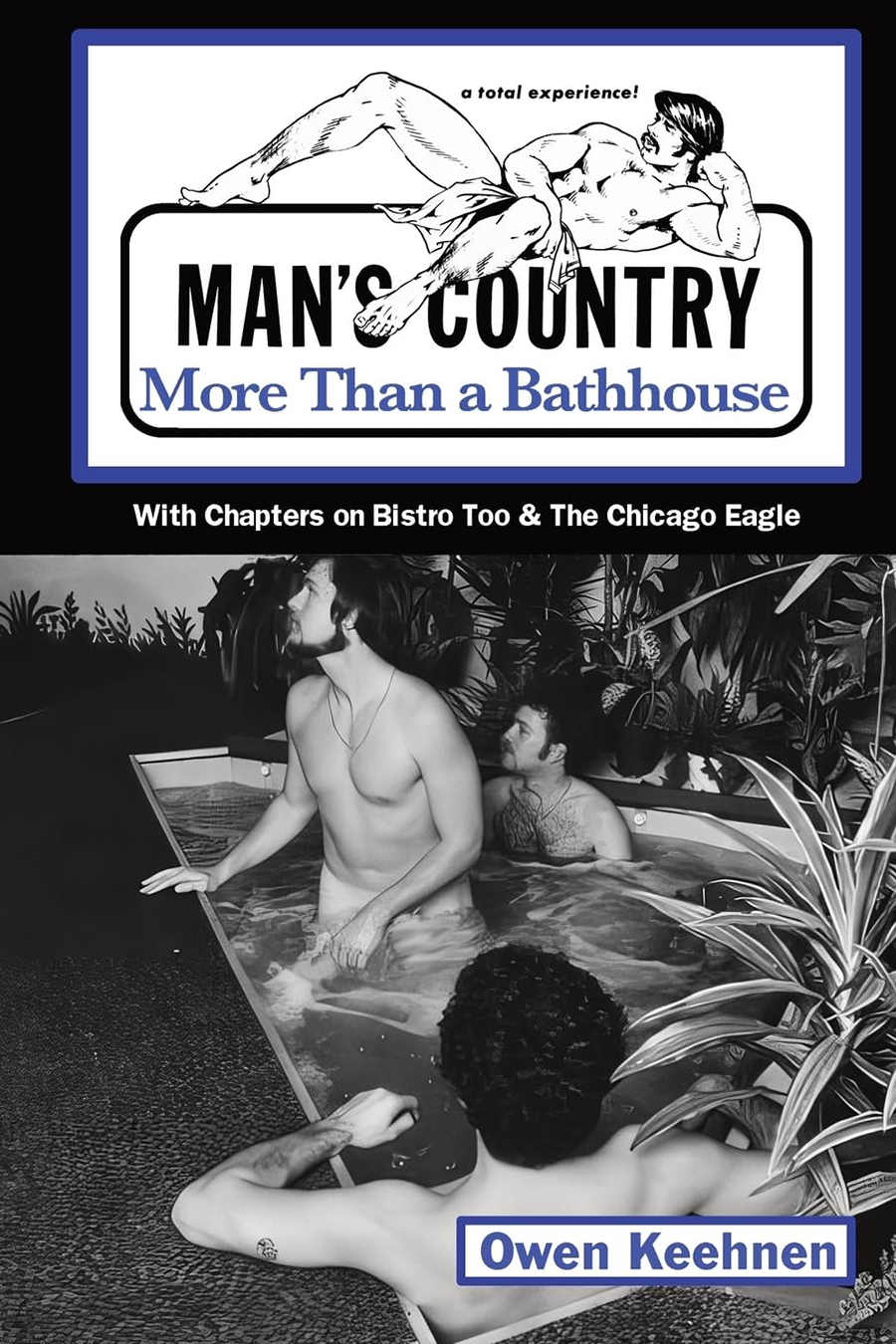Saturday, November 18, 2017, was a night to remember.
After 44 years, Man’s Country (5017 N. Clark St. in Chicago) hosted the first of two closing parties. And the old dame went out in style with Loose Ends, a 12-hour, all-inclusive “disco rave” featuring a three-story funhouse, rotating DJs, and drag performances from Divine (Lucy Stoole), Bette Midler (Toyota Corona), and Grace Jones (Coco Iman).
And, of course, a free clothes check.
My First & Last Time
That night was my first time inside Man’s Country. Although I’d been aware of its existence for decades, I never really had any reason to visit. And by 2017, it was nobody’s favorite. Truth be told, Generation X grew up not during the heights of gay liberation, but during the panic and paranoia of the AIDS crisis. As a result, we’ve been robbed of the social value, spiritual meaning, and cultural legacy of the bathhouse.
And what a legacy it was. Steam baths have been gay havens for over a century. Milwaukee’s Turkish Steam, located in a former Plankinton Mansion at 4th and Michigan, closed in 1902 due to “morals violations.” The city’s seven neighborhood natatoriums were also legendary cruising grounds on men-only days. Throughout the 1970s, Milwaukee had four fully functional gay bathhouses. They were, unfortunately, targeted by the Milwaukee Vice Squad with brutal and oppressive raids.
By the 1980s, bathhouses around the country were demonized as “super-spreader” sites, shuttered by public health officials, and entirely extinguished nationwide.
As a result, it’s difficult for us to imagine a time when bathhouses were a place where an entire hierarchy of needs was met several nights a week. We’ve never known a communal one-stop shop that served up drinks, meals, TV viewing, movie nights, contests, drag shows, concerts, dance parties, and various forms of exercise—or the liberty of socializing with strangers in ill-fitting bath towels. But on that November night, it suddenly all made perfect sense for me, for the first time.
The freedom. The unity. The brotherhood. THIS moment is what it was all about.
Fortunately, that moment has been preserved in Man’s Country: More Than a Bathhouse by Chicago author Owen Keehnen. Keehnen, the co-founder of Chicago’s Legacy Project, has authored a dozen books about Chicago LGBTQ history. Man’s Country is an expertly researched, multi-faceted, and respectful tour of the bathhouse as a cultural cornerstone. Packed with meaningful memoirs and torrid testimonials, Man’s Country is an inspiring and liberating read.
“They Go Somewhere Else to Hook Up”
After opening the Gold Coast (501 N. Clark St. in Chicago) in 1960, believed to be the first leather bar in America, Chuck Renslow noted a business opportunity.
“They come to the bar, and they drink, but then they go someplace else to hook up,” he realized. Renslow decided he wanted to own places where people could hook up. First, he owned peep show arcades like Machine Shop and Tool Box, and then gay male hotels like Barracks and Crystal Hotel in River North. After investing in Club Baths Chicago, he realized that even the hook-up places could be something bigger, something better, something more.
New York’s Continental Baths inspired Renslow to create something spectacular for Chicago. On September 19, 1973, he opened the first floor of Man’s Country and gave away 700+ free memberships. Over the next 44 years, thousands became lifetime members at the low, one-time fee of only $10. Those memberships protected gay men against the raids, stings, and harassment of everyday life.
The rest is history. Man’s Country hosted Sally Rand, Wayland Flowers and Madame, Holly Woodlawn, Cherry Vanilla, Charles Busch, Julie Brown, Judy Tenuta, Rusty Warren, Bruce Vilanch, and many, many more. Stage manager Wanda Lust hosted shows of all sorts—drag shows, game shows, variety shows, fashion shows, sock hops, homecoming balls, holiday pageants, movie nights, porn film festivals—and talent competed to be seen on this famous stage. Man’s Country hosted the Black and Blue Ball, the traditional closing party of the International Mr. Leather Contest, for several years.
Unfettered Community Space
Man’s Country had an enormous presence in Chicago’s earliest Gay Pride parades. The bathhouse was also a home base for community fundraising, advocacy, political action, sporting events, and even health screenings. In 1975, Renslow partnered with Chicago Gay Health Project to open a culturally competent onsite STD testing clinic. Within three years, the clinic had screened thousands of visitors, and expanded access to care by launching a mobile testing unit.
“A common misconception is that people come here just for sex,” said Renslow, “And that’s not true…they’re really here to be with people of their own kind.”
Over time, Man’s Country grew into a three-story, 20,000 square foot complex, with experiences including the largest steam room in the Midwest, a subterranean dungeon with a triple-sized hot tub and rain curtains, private leather code rooms, a row of glory holes, a Sling Room, and the legendary “Orgy Room” (which was, oddly enough, carpeted). On weekend mornings, the spa offered continental breakfast on its rooftop sundeck, accessible by spiral staircase. The lower level offered a 24-hour souvenir shop and snack bar (later, a juice bar) for visitors. In 1996, an adult film was shot within those walls, and later, the first two Grabby Awards ceremonies were hosted there.
“Man’s Country is like a mythical fantasy land somewhere around the corner from Nirvana,” wrote Drummer magazine.
Provocative, sex-positive advertising did the trick. Members came from all over the Midwest. Some stayed for hours—others checked in for days on end. At the height of its popularity, there were lines down Clark Street waiting hours to get in.
But why? Former members explain in their own words:
“It was a political statement to celebrate your sexuality in the 1970s. At Man’s Country, I felt so much positive sexual energy. I felt connected to a real community.”
“I had to be straight all day, but at Man’s Country I could be myself. There was such power being around people and not having to hide who I was.”
“Man’s Country was a self-contained place, where we were sequestered from the rest of the world that didn’t get us. It was not just hot and sexy—there was a sense of camaraderie and safety to just hang out in this all-male, gay world.”
“Man’s Country was wrong in all the right ways. There was something primal there. It was like a thrilling throwback to a more exciting time. This is what being a sexual outlaw felt like. I liked feeling that I was doing something subversive.”
“It was down and dirty, raunchy, a little terrifying, but always very sexy.”
The AIDS Crisis and Bistro Too
The AIDS crisis deeply wounded Man’s Country, and business never truly recovered to earlier levels. Renslow decided to reinvent his business. He partnered with club king Eddie Dugan to resurrect the Bistro, once known as the “Studio 54 of the Midwest.” Bistro Too opened in October, 1987 as a gay bar packed with glitterati. The high-energy dance club, decorated in a combination of Art Deco and high-tech, was the kind of place where anything could happen. Many remember hearing house music for the first time at Bistro Too. Oversized video monitors showed surreal video clips, robotic lighting pulsated in time with the music, cash cannons and glitter explosions were constantly firing off, and host Memory Lane (dressed as a nurse) sold shots on the dancefloor out of an IV bag.
Performances included Divine, Boy George, the Village People, Thelma Houston, and Hazell Dean. Porn stars visited on a regular basis, including Jeff Stryker, and a “porn star suite” was built upstairs while a shower was installed on the club’s stage. Bistro Too hosted the Chicago Meatpackers, an in-house dance team founded by Tyler Adair of Milwaukee. And there was never a dull moment: Events ranged from Drag Queen Wrestling to Techno Night, from Vampire Circus to Strip Search.
The Chicago Eagle And Sale
The Bistro Too was reinvented as the Chicago Eagle in 1993. Customers now entered through the cab of a semi-truck parked in the alleyway. The leather bar featured relics from the Gold Coast, including the neon sign for The Pit, an actual trap door in the floor that opened at 11 p.m. nightly. Despite being incredibly popular, the Eagle closed in 2006. Chuck felt it lacked the mystique, ambience, and magic of the old Gold Coast. Customers didn’t entirely agree.
“It felt like we were losing a part of our world and it was not coming back,” said an Eagle fan. “It was saying goodbye to the place where we could explore and be free. The Eagle was a place to be uninhibited and learn the unspoken leather code of ethics. To see it close was heartbreaking.”
Over the next 10 years, Man’s Country became increasingly run down to the point where some areas were actually falling apart. Maintenance was an ongoing battle that Chuck, now in his eighties, couldn’t keep fighting. In October 2016, he finally surrendered—and agreed to sell Man’s Country.
“Land is premium in Andersonville, and Man’s Country occupies a lot of land,” said Chuck. “They’ll probably tear it down and build condos.”
“Real estate taxes killed Man’s Country,” said Ron Ehemann, “the age of these gigantic bathhouses is probably over.”
Chuck died June 29, 2017, at age 87. Following the two Loose Ends parties in November 2017 and New Year’s Day 2018, auctioneers dismantled and sold the property. Items included lockers (sold in blocks of six), room keys, key racks, lights, artwork, membership cards, sheets (sold in $5 grab bags), room doors, slings, metal bars, the St. Andrew’s cross, and glory holes. Some items were donated to the Leather Archives & Museums. Following one last scavenger hunt, long-time members even salvaged bricks from the demolished ruins.
The space was that sacred to them.
“Sure, it could be sketchy, but Man’s Country was a comfort. No matter what was going on in the outside world, this other place was here for rent six hours at a time. It had changed, and yet it really didn’t. Behind these walls, guys could have the fun they needed to have, do what they needed to do, and then go about their business. That freedom meant something.”
“If you left Man’s Country, and you didn’t have a good time—it was your own damn fault.”
Man’s Country: More Than a Bathhouse is now available from independent booksellers everywhere.
























0 Comments